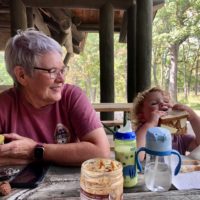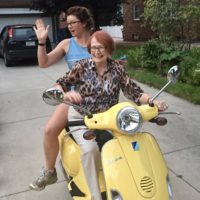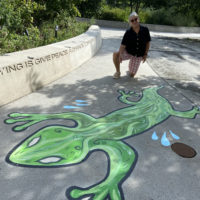Settle, Create & Play. Then Grow

 Cyndy Erickson gave me a book and an invitation last Christmas. The book is My Grandmother’s Hands by Resmaa Menakem. The invitation was to connect remotely with her, and others to talk about the book, its impact on us, and America’s relationship with race.
Cyndy Erickson gave me a book and an invitation last Christmas. The book is My Grandmother’s Hands by Resmaa Menakem. The invitation was to connect remotely with her, and others to talk about the book, its impact on us, and America’s relationship with race.
As we read and talked about the book over several months, I decided to create a new set of Mindfulness & Movement Activity Cards, that will take some of these powerful tools into classrooms. I shared the book with Sara, and we began working on The Growth Deck.
In the first chapters of My Grandmother’s Hands, Menakem writes about how all Americans, including Europeans, fled violence, plague and starvation. They were willing to leave the only world they knew and make the arduous journey to a place they could barely imagine. Think about moving to Mars!
I have to admit I hadn’t considered this, and I certainly hadn’t applied it to my own heritage. But truly, all the people who settled the American continent since the 15th century came from or through trauma. Whether risking their lives by choice, or by force.
 My mother’s people came from Britain before the colonies rebelled against the British king and taxes. I’ve never done a lot of research, but they were likely fleeing religious persecution or destitution. My dad’s grandparents fled Germany in the 19th century to escape being conscripted to fight in the second Prussian war.
My mother’s people came from Britain before the colonies rebelled against the British king and taxes. I’ve never done a lot of research, but they were likely fleeing religious persecution or destitution. My dad’s grandparents fled Germany in the 19th century to escape being conscripted to fight in the second Prussian war.
Menakem writes graphically about the atrocities they fled; it gave me nightmares. I had to stop reading the book before I went to sleep. Those nightmares alone convinced me there was truth to the premise of My Grandmother’s Hands.
Africans were kidnapped, survived the Middle Passage (or didn’t) and were enslaved in the Americas. They suffered trauma I have nothing in my background to compare. Menakem’s point is that we all have ancestral trauma we’re carrying in our bodies.
He asserts that recognizing our own trauma is key to healing the racial divide at the core of our country’s strife. It’s helpful to us White folks to consider our experience in ways that aren’t guilt and shame based.
 Collective trauma causes us to go straight to our lizard brains when we see someone from a different race, or a police officer. We react with a flight, fight, freeze or freak out response. Menakem suggests we need to pause and settle so we can react rationally to people who look different from us.
Collective trauma causes us to go straight to our lizard brains when we see someone from a different race, or a police officer. We react with a flight, fight, freeze or freak out response. Menakem suggests we need to pause and settle so we can react rationally to people who look different from us.
In My Grandmother’s Hands, he offers exercises for settling. We’ve incorporated eight of them into the “Settle” section of The Growth Deck. The other two sections, “Create” and “Play” include more of his ideas.
“Create” offers eight activities using simple art supplies, including Zentangles and several watercolor techniques.
Eight activities connecting with nature, and just having fun are the essence of “Play.” If you’re curious about shinrin yoku (forest bathing) there are several in this section. There are even ideas you can use at your next party; Cooperative Musical Chairs anyone?
